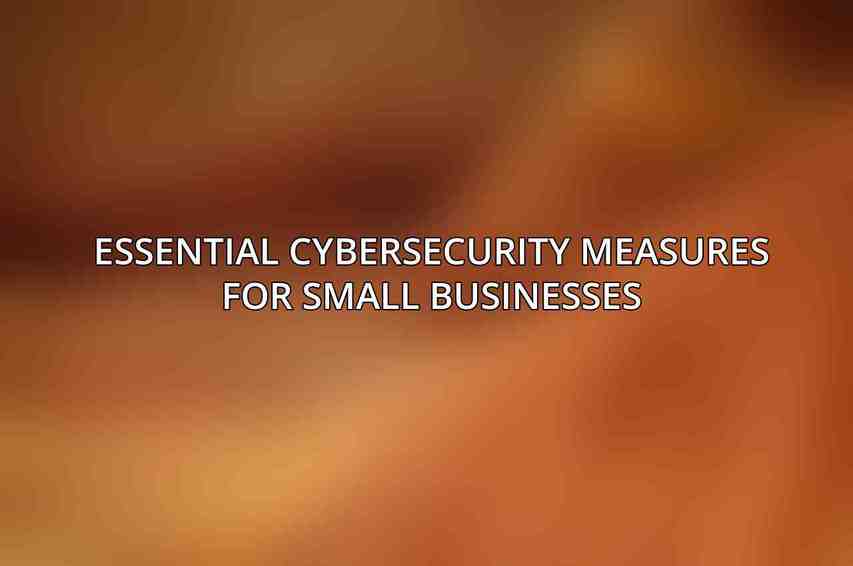cybersecurity has become a critical concern for businesses of all sizes. Small businesses, in particular, are increasingly becoming targets for cyberattacks due to their perceived vulnerability and valuable data. The prevalence and impact of cyberattacks on small businesses are alarming, with reports indicating that nearly 43% of all cyberattacks target small businesses. These attacks can result in financial losses, reputational damage, and even business closure. Small businesses face unique cybersecurity challenges stemming from limited resources, lack of dedicated IT staff, and often outdated security measures. Dive deeper into Top Cybersecurity Software of 2024 for Businesses
Essential Cybersecurity Measures for Small Businesses

A. Implementing Anti-Malware Software
One of the fundamental cybersecurity measures for small businesses is implementing anti-malware software. This software helps detect and remove malicious programs that can compromise sensitive data. Various types of anti-malware software exist, including antivirus, anti-spyware, and anti-ransomware. When choosing anti-malware software, features like real-time protection, automatic updates, and deployment options (cloud-based or on-premise) should be considered. Some recommended anti-malware software for small businesses include Bitdefender Antivirus Plus, Norton 360, and Malwarebytes Anti-Malware.
B. Strengthening Network Security
Network security is crucial for safeguarding small businesses against cyber threats. Installing a firewall is a basic yet essential step in securing networks. Firewalls come in different forms such as hardware-based, software-based, and cloud-based, offering functions like access control, threat detection, and intrusion prevention. Recommended firewalls for small businesses include pfSense, OPNsense, and Sophos UTM. Additionally, deploying intrusion detection and prevention systems (IDS/IPS) enhances network security by detecting and blocking unauthorized network activities. Popular IDS/IPS solutions for small businesses are Snort, Suricata, and Open Source Security (OSSIM).
C. Employing Multi-Factor Authentication (MFA)
Multi-Factor Authentication (MFA) adds an extra layer of security by requiring users to provide multiple forms of verification before accessing systems or data. This helps reduce the risk of unauthorized access and data breaches. MFA methods include SMS-based codes, app-based authenticators, and biometrics. Recommended MFA solutions for small businesses are Google Authenticator, Authy, and Duo Security.
D. Educating Employees on Cybersecurity Best Practices
Employees play a significant role in maintaining cybersecurity within a business. Educating them on cybersecurity best practices through training programs is essential. Topics such as password management, recognizing phishing scams, and understanding social engineering tactics should be covered. Resources like cybersecurity training from the National Institute of Standards and Technology (NIST) and materials provided by the Cybersecurity and Infrastructure Security Agency (CISA) can aid in educating employees effectively.
Additional Cybersecurity Measures for Consideration
A. Implementing a Virtual Private Network (VPN)
A Virtual Private Network (VPN) is a valuable tool for securing communications and data transmission over networks, especially for remote workers. VPNs provide encrypted connections that enhance privacy and prevent unauthorized access. Different types of VPNs include site-to-site, remote access, and SSL VPNs. Recommended VPN services for small businesses are NordVPN, ExpressVPN, and ProtonVPN.
B. Using a Cloud-Based Security Solution
Cloud-based security solutions offer scalability, cost-effectiveness, and reduced maintenance overhead for small businesses. Services like Security Information and Event Management (SIEM), Cloud Security Posture Management (CSPM), and Cloud Workload Protection Platforms (CWPP) help secure cloud environments effectively. Recommended cloud security solutions include Microsoft Azure Sentinel, Amazon Web Services (AWS) GuardDuty, and Google Cloud Security Command Center (SCC).
Monitoring and Maintenance
A. Importance of Regular Security Monitoring
Regular security monitoring is crucial for detecting and responding to potential threats in a timely manner. Utilizing tools like log management and threat detection alerts helps small businesses stay vigilant against cyber threats.
B. Maintaining Cybersecurity Updates
Keeping software and operating systems up to date is essential for addressing security vulnerabilities and protecting systems from exploitation. Regular patching and vulnerability management practices should be implemented to ensure a secure IT environment.
implementing robust cybersecurity strategies is imperative for small businesses to safeguard their data, operations, and reputation. By adopting essential cybersecurity measures like anti-malware software, network security protocols, MFA, and employee training, small businesses can bolster their defenses against cyber threats. Additionally, considering advanced measures like VPNs, cloud-based security solutions, and maintaining regular monitoring and updates can further enhance cybersecurity resilience. Continuous vigilance and a proactive approach to cybersecurity are key to mitigating risks and maintaining a secure business environment in the digital age.
Frequently Asked Questions
What are some common cybersecurity threats that small businesses should be aware of?
Common cybersecurity threats for small businesses include phishing attacks, ransomware, malware, and data breaches. It’s important for small businesses to stay informed about these threats and implement preventive measures.
How can small businesses improve their cybersecurity measures on a limited budget?

Small businesses can improve their cybersecurity measures on a limited budget by investing in basic security tools like antivirus software, firewalls, and regular employee training. They can also consider outsourcing their cybersecurity needs to affordable IT security providers.
Why is cybersecurity important for small businesses?
Cybersecurity is important for small businesses because they are often targeted by cybercriminals due to their weaker security defenses. A successful cyber attack can result in financial loss, damage to reputation, and legal consequences for a small business.
What steps should small businesses take to protect their sensitive data?
Small businesses should take steps such as implementing strong password policies, encrypting sensitive data, restricting access to critical information, and regularly backing up data. It’s also crucial to keep software and systems updated to prevent vulnerabilities. Find more on How to Prevent Data Breaches: Strategies and Tips
How can small businesses create a cybersecurity incident response plan?
Small businesses can create a cybersecurity incident response plan by identifying potential risks, designating a response team, outlining procedures for reporting incidents, and conducting regular drills to test the effectiveness of the plan. They should also consider having a communication strategy in place to notify stakeholders in case of a data breach.

